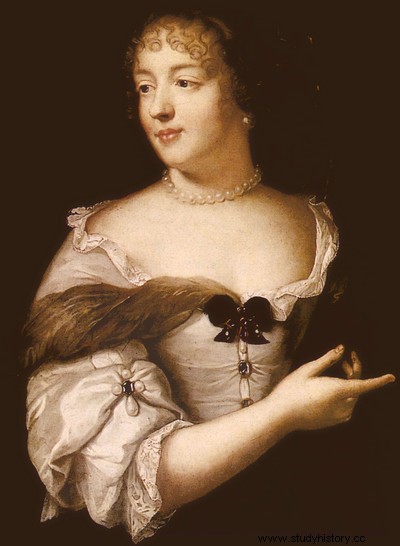Marie de Rabutin-Chantal , known as the Marquise de Sévigné (1626 – 1696), is a French woman of letters known for her epistolary writings.
A young widow
 Daughter of Marie de Coulanges and Celse-Bénigne de Rabutin, Baron de Chantal, Marie de Rabutin-Chantal was born February 5, 1626 in Paris. She lost her father at the age of one, in 1627, then her mother in 1633 and went to live with her maternal grandfather. He in turn died in 1636 and Marie moved in with a maternal uncle, Philippe de Coulanges. Pampered, she received a quality education, thanks in particular to another uncle Christophe de Coulanges, and learned Italian and Latin.
Daughter of Marie de Coulanges and Celse-Bénigne de Rabutin, Baron de Chantal, Marie de Rabutin-Chantal was born February 5, 1626 in Paris. She lost her father at the age of one, in 1627, then her mother in 1633 and went to live with her maternal grandfather. He in turn died in 1636 and Marie moved in with a maternal uncle, Philippe de Coulanges. Pampered, she received a quality education, thanks in particular to another uncle Christophe de Coulanges, and learned Italian and Latin.
In 1644, at age 18, she married the Marquis Henri de Sévigné, with whom she had a daughter, Françoise-Marguerite, and a son, Charles. In 1651, Henri de Sévigné was killed during a duel for another woman and Marie found herself a widow at the age of 25. Rather than remarry, she chose to devote herself to the education of her children and to society life at court.
Twenty-five years of correspondence
In 1669, Françoise-Marguerite married the Comte de Grignan; the latter was appointed lieutenant-general in Provence by Louis XIV and Françoise-Marguerite was to follow him there. Two days after her departure, Marie wrote her daughter a letter, the first of a long series. At the rate of two or three letters a week for twenty-five years, she sent more than a thousand letters to Françoise-Marguerite. Living at court, she describes Parisian society with talent and humour, lightness or cruelty. She also talks about more intimate things related to family and family love. She writes mainly to her daughter but also to her son Charles and to her friends, including La Rochefoucauld and Madame de La Fayette.
The Marquise de Sévigné died on April 17, 1696, in Grignan, where she had come to take care of her daughter. Twenty-eight of his letters were published in a collection in 1726 and other editions followed, selected and revised by Françoise-Marguerite's daughter.
The work of the Marquise de Sévigné remains founding for the epistolary genre.
